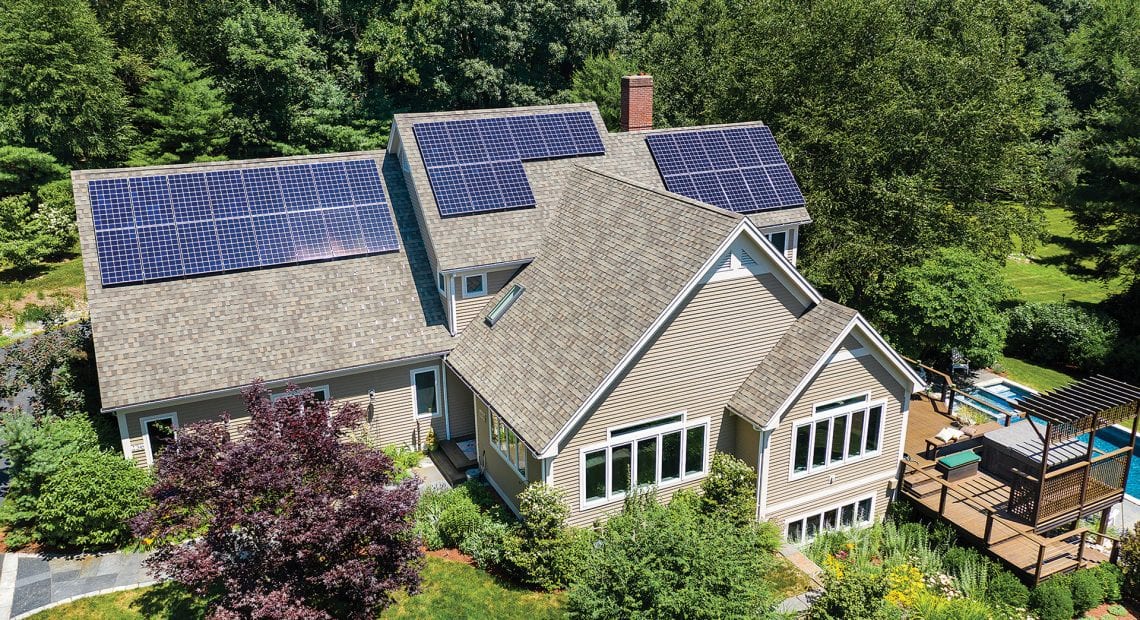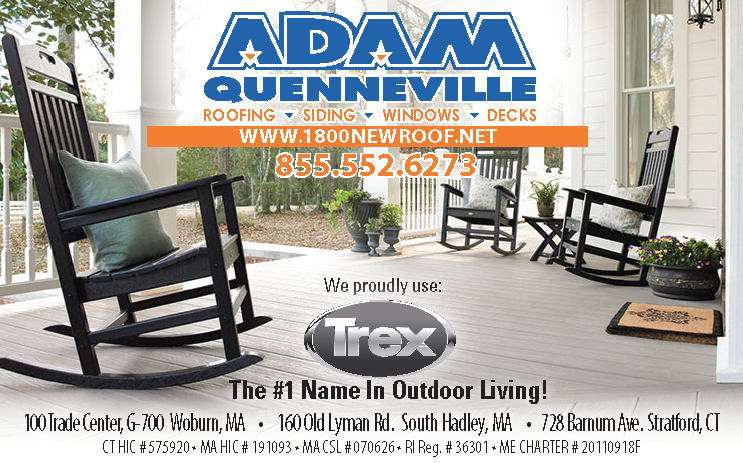Here Comes the Sun
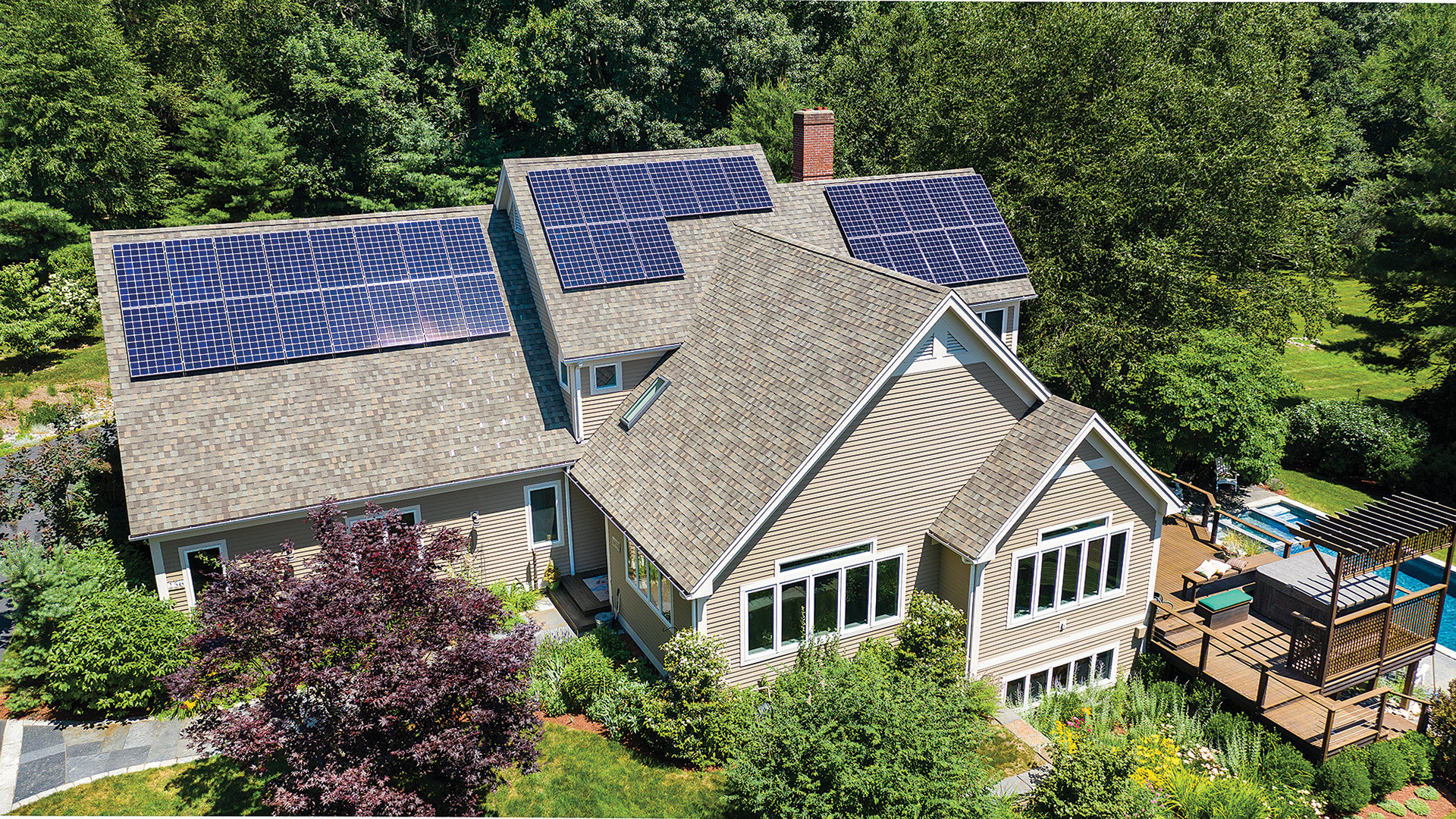
Photo by Leigh Chodos
With green-energy usage in homes rapidly increasing, there is no shortage of competition in the solar field. Home and business owners are looking for ways to save money and protect the environment, and with 211 solar installers in the state of Massachusetts, there are plenty of options. This makes standing out even more important for companies like Valley Solar, which installs solar panels for families and businesses alike.
Sixteen months ago, Mike Hempstead was a landlord with a background in sales and marketing and an interest in alternative energy.
He had six solar systems installed on properties he owned, giving him plenty of experience with various solar companies, including Valley Solar, an energy division of Valley Home Improvement in Northampton, which installed his last two systems.
“I just felt that the experience of working with the team at Valley Solar was so far superior to what I experienced with other solar companies that I knew this was the place I wanted to work when I got into solar.”
Hempstead was so impressed with the service he received that he applied for a job with the company.
“I just felt that the experience of working with the team at Valley Solar was so far superior to what I experienced with other solar companies that I knew this was the place I wanted to work when I got into solar,” he said.
These days, he’s Valley Solar’s sales manager, part of the team that provides service to customers in the four counties of Western Mass.
That service, he said, is what helps the company shine (pun intended) in a very competitive field — so competitive, in fact, that Valley Solar is one of 211 solar installers in the state of Massachusetts.
“Most customers only buy solar one time in their lives, but we treat our customers for solar as if they’re going to be a repeat customer and we give them that level of care that sets us apart,” he said.
General Manager Patrick Rondeau agreed, adding that Valley Solar makes recommendations for homeowners based on what’s best for them, not what’s hottest on the market.

Mike Hempstead says his first experience with Valley Solar was when he installed systems on two of the houses he leased, which led him to pursue a position at the company. (Photo by Leigh Chodos)
“We’re just trying to advise homeowners in a way that we’d want to be advised if we weren’t specialists in the field,” he said.
Valley Solar is a division of Valley Home Improvement, which has been around for 25 years. “About five or six years ago, the former owner of the company installed solar at his house,” said Rondeau. “He watched the process, and, having been a builder for his whole life, he thought, ‘we could do that. We should do that.’”
So, five years ago, this vision was brought to life with Valley Solar, and its relatively new status hasn’t slowed it down. The company took the 2018 Daily Hampshire Gazette Readers’ Choice Award for Best Local Solar and continues to receive raving reviews from customers.
Hempstead said much of that success comes from the firm’s home-improvement background, better enabling it to help choose the right plan for each customer.
“We’re a division of a design and build firm, and we handle all aspects of building renovation and construction, and that gives us a broader perspective of how solar integrates with other energy systems,” he said.
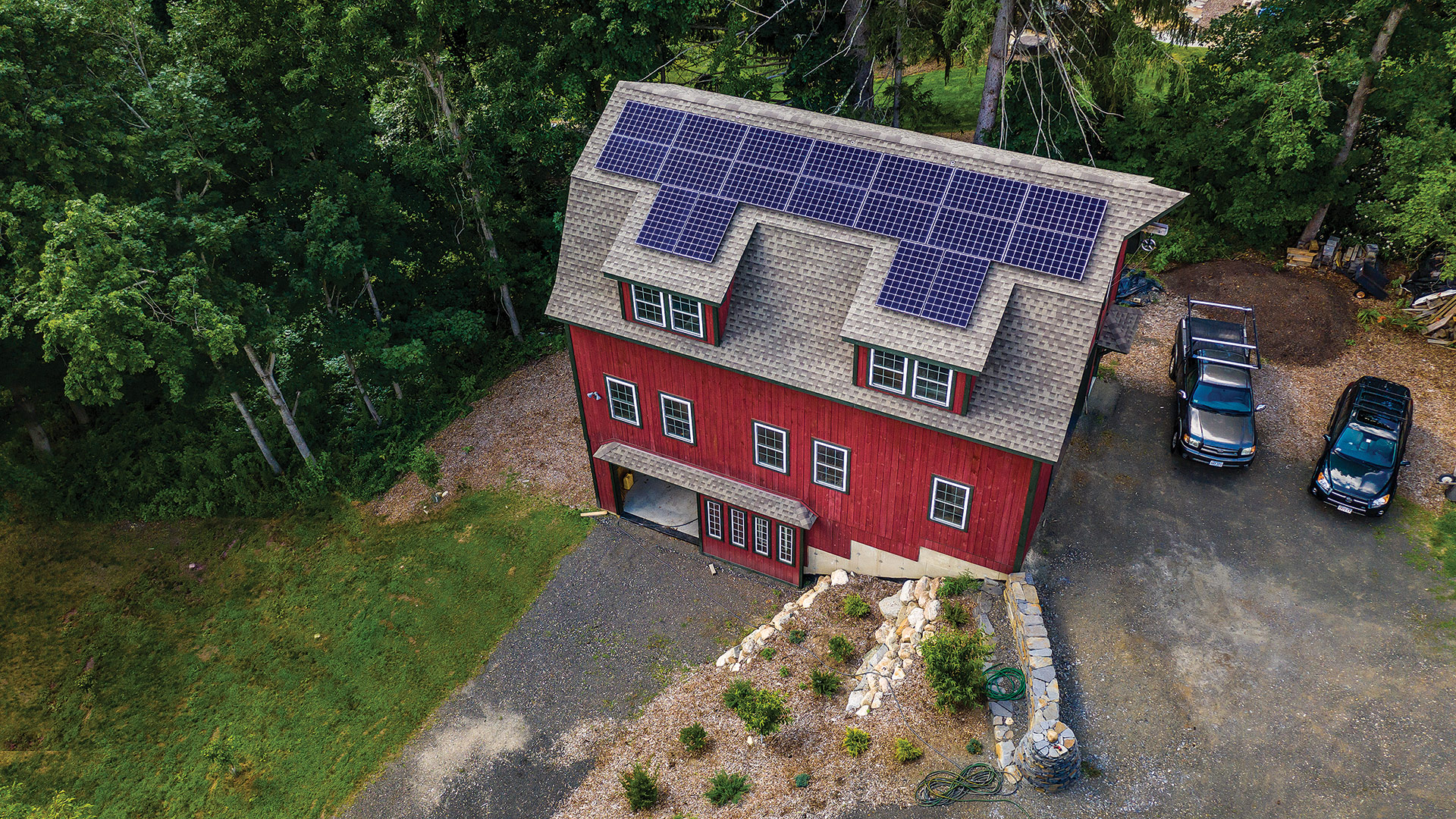
A finished system that Valley Solar installed on a home in Pelham. (Photo by Leigh Chodos)
For this issue and its green-business focus, BusinessWest talked with Hempstead and Rondeau about the solar business and the advantages it brings to customers on both the residential side and business side.
Green Makes Green
Rondeau started by stating the obvious: solar technology is environmentally friendly.
 But what many people don’t realize, he went on, is that it is also a huge money-saving strategy.
But what many people don’t realize, he went on, is that it is also a huge money-saving strategy.
“Right now, if you’re simply paying the utility, you’re paying what they’ll have you pay,” said Rondeau. “If you have your own system, you don’t worry about what they’re charging; you’ve taken care of that.”
Perhaps one of the greatest incentives is the constantly rising cost of energy, which has been going up at twice the rate of inflation, Hempstead noted. Massachusetts has the third-highest residential electricity rate in the country, coming in at 22.57 cents per kilowatt-hour, topped only by Hawaii (32.09) and Rhode Island (22.67). And these numbers will only continue to rise.
“Your savings are far greater than they were in the past because the cost of energy is so much more than it was,” he said. “At the same time, panels have become more powerful, so you’re getting more energy for less cost.”
Webber and Grinnell Insurance is one local business that recently installed solar panels on their property, and Vice President of Operations Richard Webber said the investment has been 100% positive so far.
“We’ve basically eliminated our monthly electric charge, which is really our only utility in the building,” he said. “We do all of our limited heating and air conditioning with the solar panels now.”
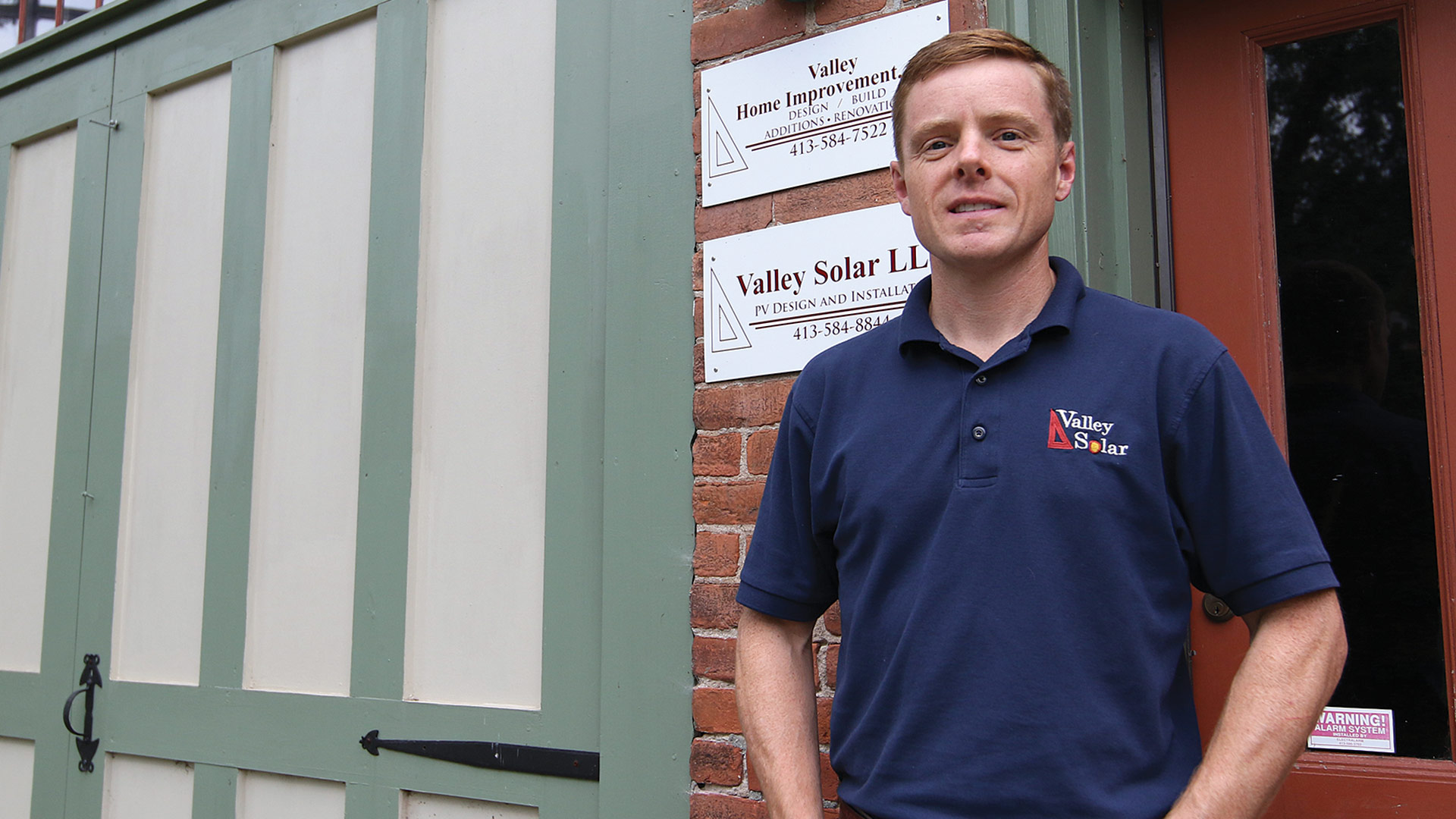
Patrick Rondeau says Valley Solar recommends products for homeowners based on what’s best for them, not what’s hottest on the market.
President Bill Grinnell agreed, and said the incentives were another reason why the company chose to go solar.
“As a business owner, you’re very concerned with the investments you make and the return you get,” he said, adding that, while the upfront investment is a good chunk of change, the tax credit he gets will make it worthwhile. “With the incentives that are out there, I think it’s a great investment.”
These incentives are another reason why many businesses and homeowners alike have invested in solar energy, but they’re always shifting. Commercial and residential owners who have just installed their solar systems receive a federal tax credit for 30% of the system, but not for long. Congress passed a multi-year extension of the solar Investment Tax Credit (ITC) in 2015, with a 30% incentive for systems installed in 2019, a 26% incentive in 2020, 22% in 2021, and 10% in 2022 for commercial and utility scale, but none for residential.
Still, even with this news, there are still plenty of reasons to consider solar installation, including accelerated depreciation. While business customers still get the 30% federal tax credit for their business, they also get a 100% bonus depreciation in their first year with solar.
“This will effectively, depending on your tax rate, give you another 20-25% back in the first year,” said Hempstead. “So, you have 50-55% of your system paid for the next time you pay taxes.”
Bright Idea
The numbers speak for themselves, said Rondeau, adding that he predicts prices for solar installation will continue to drop in the next few years.
“Solar can and often does pay for itself in a relatively short period of time,” he said. “I think we have reached a tipping point where most folks, if they can see the numbers, can convince themselves that it’s worth the investment.”
Kayla Ebner can be reached at [email protected]



